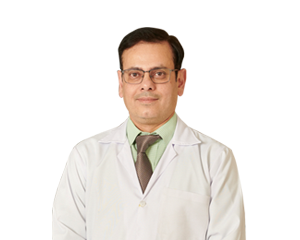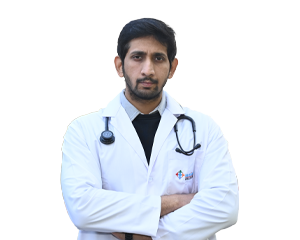Department of Pulmonary And Sleep Medicine
The Department of Pulmonary and Sleep Medicine at Asian Institute of Medical Sciences is headed by Dr. Manav Manchanda (MD, Respiratory Medicine and DNB, Critical Care). The department caters to patients of various respiratory disorders like Bronchial Asthma, COPD, Tuberculosis, Pneumonia, Lung Cancer and Interstitial Lung Diseases. The department is equipped with latest bronchoscopic facility for both adults and pediatrics. We also have an excellent facility for handling serious respiratory diseases in ICU, which has latest ventilators and BiPAP support.
Technology
Video Bronchoscope
There is a video bronchoscope, which is available only at our institute in Faridabad. It helps to diagnose any pathology within the lungs endoscopically which includes:
- Sampling of lung tissues
- Perform laser therapy
- Remove foreign objects
- Suction of sputum for microbiological culturing
- Perform complex intubations
- Insertion of catheters
- Diagnose lungs problems endoscopically
Sleep Lab
Our sleep lab helps in diagnosing various sleep disorders and the effect of treatment can be titrated as well. Sleep lab helps in the management of:
- Sleep disordered breathing (SDB)
- Abnormal respiratory patterns
- Insufficient ventilation during sleep
- Obesity hypoventilation syndrome (Pickwickian syndrome)
- COPD
- Neuromuscular disease
- Chest wall disorders
- SDB and cardiovascular disease
- SDB and metabolic disorders
- SDB and obesity
Endobronchial Ultrasound Bronchoscopy (EBUS)
This department is facilitated with one of the most advanced equipment for respiratory treatment known as EBUS. With the help of Endobronchial Ultrasound Bronchoscopy, patients recover quickly and can usually go home the same day. The benefits of EBUS are:
- Diagnosing and staging lung cancer
- Detecting infections
- Identifying inflammatory diseases that affect the lungs, such as sarcoidosis or other cancers like lymphoma
- Real-time imaging of the surface of the airways, blood vessels, lungs and lymph nodes
- The accuracy and speed of the EBUS procedure lends itself to rapid onsite pathologic evaluation
- EBUS is performed under moderate sedation or general anesthesia
Pulmonary Function Lab
We have a state-of-the-art pulmonary function lab that gives a computerized estimate of lung functions. The two main benefits of Pulmonary Function Test (PFT) are:
- Spirometry: It is used to measure how well the lungs exhale. The information gathered during this test is useful in diagnosing certain types of lung disorders but is most useful when assessing for obstructive lung diseases (especially asthma and chronic obstructive pulmonary disease, COPD).
- Lung volume measurement: It detects restrictive lung diseases. In this set of diseases, a person cannot inhale a normal volume of air. Restrictive lung diseases may be caused by inflammation or scarring of the lung tissue (interstitial lung disease) or by abnormalities of the muscles or skeleton of the chest wall.
 Appointment
Appointment  Lab Report
Lab Report Find a Doctor
Find a Doctor  Health/Lab Packages
Health/Lab Packages 







